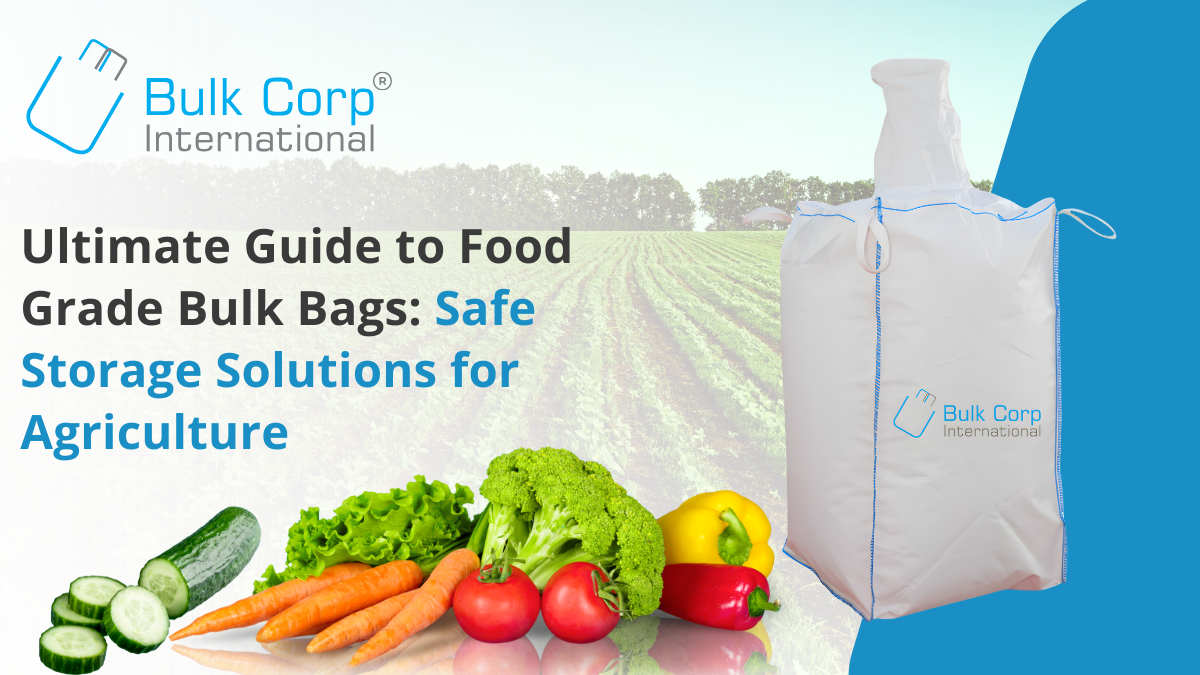Ultimate Guide to Food Grade Bulk Bags: Safe Storage Solutions for Agriculture

In the agricultural sector, ensuring product safety, hygiene, and quality during storage and transportation is of utmost importance. From grains and seeds to sugar and flour, agricultural commodities demand packaging that preserves freshness and prevents contamination. This is where Food Grade FIBC (Flexible Intermediate Bulk Containers) come into play. Designed for the highest levels of cleanliness and safety, Food Grade FIBC Bags are the go-to choice for agricultural producers, food processors, and exporters seeking reliable storage solutions.
This ultimate guide explores everything you need to know about Food Grade Bulk Bags — their benefits, manufacturing standards, and why they are essential for safe agricultural storage.
1. What Are Food Grade FIBC Bags?
Food Grade FIBC Bags, also known as Food Grade Jumbo Bags or Food Grade FIBC Bulk Bags, are large, flexible containers made from woven polypropylene fabric that meet strict food safety and hygiene standards. These bags are designed specifically to store and transport food-related products without compromising their quality or safety.
Unlike regular FIBCs, food-grade bags are manufactured in a cleanroom environment under rigorous controls that comply with international food safety standards such as BRC (British Retail Consortium), ISO 22000, and FDA (Food and Drug Administration) guidelines.
2. Why Food Grade FIBC Bulk Bags Are Important in Agriculture?
Agricultural produce such as grains, pulses, rice, sugar, starch, and flour are highly susceptible to contamination and moisture damage during storage and transit. Using standard bulk bags can expose these materials to environmental contaminants, odor absorption, and microbial growth.
Food Grade FIBC Bulk Bags offer:
- Superior Hygiene: Manufactured in dust-free and pest-controlled facilities.
- Contamination Prevention: Made with 100% virgin polypropylene resin, ensuring purity and no recycled content.
- Extended Shelf Life: Protect contents from moisture, UV rays, and oxidation.
- Traceability: Each bag is traceable back to its production batch, ensuring accountability and quality assurance.
These benefits make Food Grade Bulk Bags a vital component of the agricultural supply chain.
3. Manufacturing Standards for Food Grade FIBC Jumbo Bags
The quality of Food Grade FIBC Jumbo Bags depends on adherence to strict manufacturing protocols. Below are some of the key aspects that ensure safety and compliance:
a. Cleanroom Production
The manufacturing of food-grade bags takes place in cleanrooms where humidity, temperature, and airborne particulates are closely controlled. Workers follow hygienic practices and wear protective gear to prevent contamination.
b. Material Selection
Only 100% virgin polypropylene (PP) is used in production. This ensures that the bag does not release any harmful chemicals into the stored product.
c. Metal Detection and UV Stabilization
All finished bags pass through metal detectors to eliminate any metallic contaminants. Additionally, they are UV-stabilized to prevent degradation during outdoor storage.
d. Food-Safe Coatings and Liners
Some agricultural products require additional protection. In such cases, food-grade liners made of LDPE or aluminum foil can be inserted inside the Food Grade FIBC Bags to provide extra barriers against moisture, oxygen, and light.
4. Key Features of Food Grade FIBC Bags
Food Grade FIBC Bags are engineered to deliver both safety and functionality. Here are their most notable features:
- Antistatic and Conductive Properties: Prevent electrostatic discharge when handling fine powders.
- Custom Sizes and Capacities: Available in various dimensions, usually ranging from 500 kg to 2000 kg capacity.
- Liner Options: LDPE, aluminum, or multilayer liners depending on the application.
- Printing and Labeling Options: Custom printing for branding and identification.
- Dust-Proof and Moisture-Proof Seams: Reinforced stitching ensures product integrity during long-distance transport.
These features make them ideal for storing a wide range of food-grade agricultural products.
5. Applications of Food Grade Bulk Bags in Agriculture
Food Grade Bulk Bags are used in multiple agricultural and food-processing applications, including:
- Grain Storage: Wheat, rice, corn, and barley can be safely stored for extended periods.
- Seed Packaging: Ideal for storing and transporting high-value seeds without risk of contamination.
- Sugar and Flour Handling: Prevents moisture ingress and ensures purity.
- Animal Feed and Nutraceuticals: Keeps nutritional value intact by blocking exposure to air and light.
- Spices and Pulses: Maintains aroma, freshness, and quality during export.
Their versatility, combined with safety, makes Food Grade FIBC Bags a preferred choice for both domestic and international agricultural operations.
6. Advantages of Using Food Grade FIBC Jumbo Bags
Here’s why more and more agribusinesses are choosing Food Grade FIBC Jumbo Bags for their packaging needs:
- Cost-Effective: They can carry large volumes, reducing packaging and transportation costs.
- Sustainable: Recyclable materials make them an eco-friendly option.
- Durable: Strong woven fabric minimizes the risk of tearing or leakage.
- Space-Efficient: Easy to stack, store, and transport.
- Customizable: Tailored to meet specific industry and product needs.
With these benefits, they not only streamline logistics but also ensure safety compliance for food-grade applications.
7. How to Choose the Right Food Grade FIBC Bulk Bags
When selecting Food Grade FIBC Bulk Bags, keep the following considerations in mind:
- Certifications: Look for manufacturers certified by BRC, ISO 22000, and HACCP.
- Product Compatibility: Ensure the bag material and liner suit your product’s sensitivity to moisture or sunlight.
- Design Customization: Choose the right filling, discharging, and lifting options for operational efficiency.
- Quality Control: Verify that each bag undergoes testing for load strength, seam integrity, and contamination control.
A reliable supplier can help you navigate these specifications to ensure compliance and quality.
8. The Future of Food Grade Bulk Bags
With the rise in global food exports, sustainability regulations, and stringent safety norms, the demand for Food Grade FIBC Bags is growing rapidly. Manufacturers are innovating with biodegradable coatings, recyclable fabrics, and smart labeling technologies to improve traceability and environmental impact.
The future points toward smarter, safer, and greener Food Grade FIBC Bulk Bags that cater to the evolving needs of modern agriculture.
Bottom Line
When it comes to safe and efficient agricultural packaging, Food Grade Bulk Bags are a proven solution. They combine hygiene, strength, and versatility to ensure your agricultural products remain fresh and contamination-free throughout the supply chain.
Bulk Corp International, a trusted leader in Food Grade FIBC Bags manufacturing, provides certified, high-quality packaging solutions designed for agricultural and food industry needs. Choose Bulk Corp International for dependable, safe, and sustainable bulk bag solutions.





